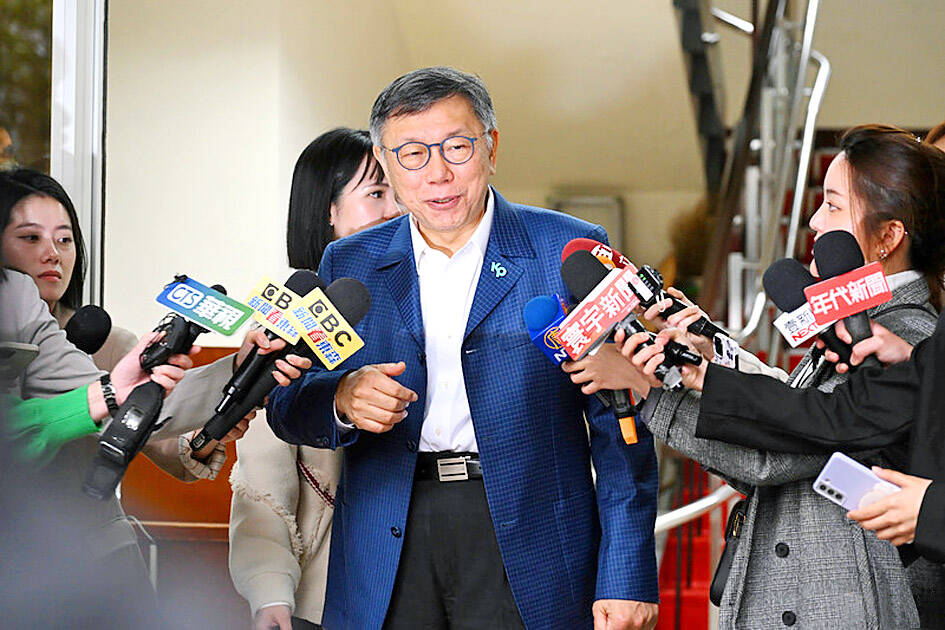A package of opposition-backed bills to expand the powers of the legislature would strengthen the nation’s democracy, Taiwan People’s Party (TPP) Chairman Ko Wen-je (柯文哲) said on Tuesday.
Ko made the comments in a Facebook post as the Legislative Yuan held third readings of the amendments, which would expand the body’s investigative powers, and add a “contempt of the legislature” offense to the Criminal Code and a provision requiring the president to be “invited” by lawmakers to give an annual “state of the nation” address.
The bills have been jointly pushed by the Chinese National Party (KMT) and the TPP, in the face of fierce opposition from the ruling Democratic Progressive Party (DPP).

Photo: Huang Ching-hsuan, Taipei Times
Ko said he “never imagined” the DPP would try to block the reforms, many of which he said the party supported during its time as the opposition party.
Contrary to the DPP’s use of the slogan “no discussion, no democracy,” the question of reforming the legislature has been under discussion “for 30 years,” Ko said.
Under five branches of government, the legislature has never received suitable authority, leaving lawmakers unable to effectively supervise or investigate other parts of the government, he said.
During its past eight years in power, the DPP had turned the legislature into a “rubber stamp” for the government, Ko said, citing the party’s passage of a bill in 2019 to hold referendums separately from elections, which, according to critics, made it more difficult for referendums to pass.
The DPP-led legislature also failed to investigate other government controversies, such as a much-criticized egg import scheme last year, he said, adding that it also did not have sufficient powers to conduct investigations properly.
The draft amendments have been discussed in two legislative committee meetings, three public hearings and in cross-party negotiations since April 1, he said.
The current version of the bills was only advanced after efforts to reach a consensus failed, he added.
Even after they were taken up by the full legislature, the amendments were read out and voted on individually, in a way that “fully adheres” to Taiwan’s democratic processes, Ko said.
“The only difference is that these reform bills aren’t being pushed by the DPP, which is why it has been so eager to negate them,” he said.
The passage of the reforms, after “30 long years” and in a legislature in which no single party holds a majority, would “leave its mark on history,” he said.
“From today, Taiwan will have a more robust system of government,” he said, adding that he was thankful to all those who supported the bills, which constitute “a milestone in the history of Taiwan’s democracy.”
In other news, Ko told a news conference yesterday he is opposed to KMT caucus whip Fu Kun-chi’s (傅崐萁) proposal to create a special investigation division composed of opposition lawmakers.
The term refers to a now-defunct Special Investigation Division (SID) of the Supreme Prosecutors’ Office that existed from April 2007 to November 2016.
Ko said that he has always opposed the SID as the organization did not represent the consistency and fairness expected of the law.
Top officials and ordinary Taiwanese should be treated the same in investigations and prosecutions, he said.
“The TPP is not in favor of establishing another SID,” he added.

An undersea cable to Penghu County has been severed, the Ministry of Digital Affairs said today, with a Chinese-funded ship suspected of being responsible. It comes just a month after a Chinese ship was suspected of severing an undersea cable north of Keelung Harbor. The National Communications and Cyber Security Center received a report at 3:03am today from Chunghwa Telecom that the No. 3 cable from Taiwan to Penghu was severed 14.7km off the coast of Tainan, the Ministry of Digital Affairs said. The Coast Guard Administration (CGA) upon receiving a report from Chunghwa Telecom began to monitor the Togolese-flagged Hong Tai (宏泰)

A cat named Mikan (蜜柑) has brought in revenue of more than NT$10 million (US$305,390) for the Kaohsiung MRT last year. Mikan, born on April 4, 2020, was a stray cat before being adopted by personnel of Kaohsiung MRT’s Ciaotou Sugar Refinery Station. Mikan was named after a Japanese term for mandarin orange due to his color and because he looks like an orange when curled up. He was named “station master” of Ciaotou Sugar Refinery Station in September 2020, and has since become famous. With Kaohsiung MRT’s branding, along with the release of a set of cultural and creative products, station master Mikan

Actor Lee Wei (李威) was released on bail on Monday after being named as a suspect in the death of a woman whose body was found in the meeting place of a Buddhist group in Taipei’s Daan District (大安) last year, prosecutors said. Lee, 44, was released on NT$300,000 (US$9,148) bail, while his wife, surnamed Chien (簡), was released on NT$150,000 bail after both were summoned to give statements regarding the woman’s death. The home of Lee, who has retreated from the entertainment business in the past few years, was also searched by prosecutors and police earlier on Monday. Lee was questioned three

RISING TOURISM: A survey showed that tourist visits increased by 35 percent last year, while newly created attractions contributed almost half of the growth Changhua County’s Lukang Old Street (鹿港老街) and its surrounding historical area clinched first place among Taiwan’s most successful tourist attractions last year, while no location in eastern Taiwan achieved a spot in the top 20 list, the Tourism Administration said. The listing was created by the Tourism Administration’s Forward-looking Tourism Policy Research office. Last year, the Lukang Old Street and its surrounding area had 17.3 million visitors, more than the 16 million visitors for the Wenhua Road Night Market (文化路夜市) in Chiayi City and 14.5 million visitors at Tainan’s Anping (安平) historical area, it said. The Taipei 101 skyscraper and its environs —